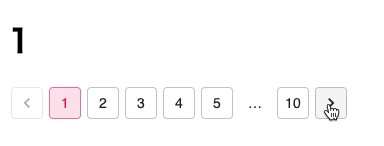Next.js × microCMS におけるページングの実装方法
フロントエンドおはこんにちばんは。今回は Next.js × microCMS で ページングを実装してみました。その手順を紹介しようと思います!
実行環境
- Next.js 10.0.4
- React 17.0.0
- Material-UI 4.11.2
一覧画面の実装
まずは雑に一覧画面を実装します。今回はUIライブラリにMaterial-UIを利用しています。構成しては以下になります。
=============
pages/
page/
[offset].tsx
=============
src/pages/page/[offset].tsx
import { GetStaticPaths, GetStaticProps, NextPage } from 'next'
import React, { useCallback } from 'react'
import { useRouter } from 'next/router';
import { Pagination } from '@material-ui/lab';
const PAGE = 10 as const;
const DynamicPage: NextPage = () => {
const router = useRouter();
const offset = router.query.offset
? Number.parseInt(String(router.query.offset), 10)
: 1;
const handleChangePage = useCallback(
(_: React.ChangeEvent<unknown>, page: number) => {
void router.push(`/page/${page}`);
},
[router],
);
return (
<div>
<h1>{router.query.offset}</h1>
<Pagination
count={PAGE}
variant="outlined"
shape="rounded"
color="secondary"
page={offset}
onChange={handleChangePage}
/>
</div>
)
}
export const getStaticPaths: GetStaticPaths = async () => {
const paths = [...Array(PAGE)].map((_, index) => ({
params: {
offset: `${index + 1}`,
},
}))
return { paths, fallback: false };
}
export const getStaticProps: GetStaticProps = async (context) => {
return {
props: {},
}
}
export default DynamicPage;
Material-UI の Pagination を使っています。ハンドラーの第二引数に次の page が取れるのでそれを元に次のページに遷移させています。こんな感じになるはずです。
microCMS で取得したコンテンツを利用
microCMS で取得したコンテンツを元にページングしていきます。今回は1ページ 3つまでコンテンツを取得するようにしています。
import { GetStaticPaths, GetStaticProps, NextPage } from 'next'
import React, { useCallback } from 'react'
import { useRouter } from 'next/router';
import { Pagination } from '@material-ui/lab';
const DynamicPage: NextPage = ({ contents }) => {
const router = useRouter();
const offset = router.query.offset
? Number.parseInt(String(router.query.offset), 10)
: 1;
const handleChangePage = useCallback(
(_: React.ChangeEvent<unknown>, page: number) => {
void router.push(`/page/${page}`);
},
[router],
);
return (
<div>
<h1>{router.query.offset}</h1>
<Pagination
count={Math.ceil(contents.totalCount / contents.limit)}
variant="outlined"
shape="rounded"
color="secondary"
page={offset}
onChange={handleChangePage}
/>
</div>
)
}
export const getStaticPaths: GetStaticPaths = async () => {
const key = {
headers: { 'X-API-KEY': process.env.API_KEY ?? '' },
};
const contents = await fetch(
`https://jun-dev.microcms.io/api/v1/contents?offset=0&limit=3`,
key,
)
.then((res) => res.json())
.catch(() => null);
const paths = [...Array(Math.ceil(contents.totalCount / contents.limit))]
.map((_, i) => i + 1)
.map((offset) => `/page/${offset}`);
return { paths, fallback: false };
}
export const getStaticProps: GetStaticProps = async ({ params }) => {
const offset = params?.offset ? String(params?.offset) : '0';
const query = {
offset: String(Math.ceil(Number.parseInt(offset, 10) - 1) * 3),
limit: '3',
};
const key = {
headers: { 'X-API-KEY': process.env.API_KEY ?? '' },
};
const contents = await fetch(
`https://your-service.microcms.io/api/v1/contents?offset=${query.offset}&limit=${query.limit}`,
key,
)
.then((res) => res.json())
.catch(() => null);
return {
props: {
contents
},
}
}
export default DynamicPage
getStaticPathsでは microCMS で totalCount と limit を返してくれるのでこれを元にpathsを生成しています。
const paths = [...Array(Math.ceil(contents.totalCount / contents.limit))]
.map((_, i) => i + 1)
.map((offset) => `/page/${offset}`);
getStaticPropsではgetStaticPathsで生成したoffsetを元にqueryを生成し、ページ単位でコンテンツを何件目から取得するかを指定しています。
const offset = params?.offset ? String(params?.offset) : '0';
const query = {
offset: String(Math.ceil(Number.parseInt(offset, 10) - 1) * 3),
limit: '3',
};
Pagination コンポーネントも totalCount と limit を元にcount(何ページ目か) を指定してあげています。
<Pagination
count={Math.ceil(contents.totalCount / contents.limit)}
variant="outlined"
shape="rounded"
color="secondary"
page={offset}
onChange={handleChangePage}
/>
これで以上です。お疲れ様でした。
さいごに
Next.js × microCMS で ページングを実装してみました。一覧ページを実装したけど、ページングがよくわからんって方に参考となれば幸いです。